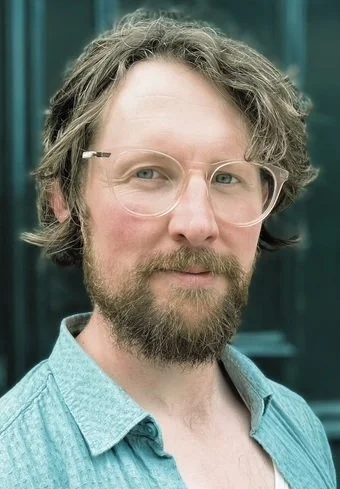“The Hubert Butler Essay Prize is a splendid thing, both a tribute to one of the very greatest exponents of the form, and a venture aimed at ensuring the continued health and vivacity of the form itself. Montaigne would approve, and so would Orwell. Write on!” John Banville, Honorary Patron
(L to R) Nicholas Grene, Adam Charles Smith, Aoife Bhreatnach, Stephanie O’Connor, John Banville, Roy Foster, Barbara Schwepcke and Catriona Crowe at the HBEP Award ceremony, Kilkenny Castle (9/9/2025).
STEPHANIE O’CONNOR - WINNER OF THE
HUBERT BUTLER ESSAY PRIZE 2025
Stephanie O’Connor
“I am deeply honoured to receive the Hubert Butler Essay Prize 2025.
“This essay began with a personal moment. In February this year, I was present at the peaceful death of someone I loved deeply. It was a moment marked by stillness and grace, intimate and unadorned, and it left behind not only sorrow, but a set of ethical and philosophical questions that would not easily let me go.
“At the same time, my daughter was preparing for her Leaving Certificate. Beside her desk, among stacked textbooks and scribbled notes, lay a copy of King Lear — unremarkable at first glance, yet quietly insistent each time I entered her room. So, when I later saw the title of this year’s essay, “Men must endure their going hence, even as their coming hither”, it seemed more like a summons than a coincidence; it felt like something I was meant to respond to.
“I wanted to attempt to reckon with that brilliant, ancient line from King Lear and ask whether such resignation still holds today. Or to what extent our relationship with death, and with birth, has shifted in an age shaped increasingly by law, medicine, and technology — through reproductive technologies, end-of-life decisions, and legal and ethical debates, including cases such as PP v HSE. We are no longer merely enduring these thresholds of life; we are actively involved in shaping them, even taking ownership of them, in ways that Shakespeare and our ancestors could scarcely have imagined. But with that power—are we any wiser?
“While writing my essay, I tried to explore the moral dynamic between autonomy, vulnerability, and responsibility in the context of dying, and care. Reading Hubert Butler’s work gave me not only the courage to write and ask difficult questions, but also the tools to approach them with greater clarity and care. And to recognise that, for all our advancements, when medicine, law, and conscience intersect, we remain haunted by the same uncertainties — about suffering, dignity, and what it means to act wisely.
“The moral complexity between endurance, intervention, and imposition lies at the heart of modern life and medicine, and it seemed to me a tension that Hubert Butler would have recognised. His writing is rooted in the belief that history is not something remote, abstract or settled, but something lived and shaped by conscience and contested by individuals. He understood the complexity and pressure of moral decision-making — when to speak, when to remain silent, when to act. Whether writing about the displaced Jews of wartime Europe, the abuses of power in church and state, or the obligations of a writer in the public square, he resisted simplification. He valued clarity over certainty, and moral courage over conformity.
“If Hubert Butler were to reflect on contemporary medicine and ethical questions such as somatic prolongation, I believe he would likely bring to bear the same moral seriousness and insistence on personal responsibility that shaped his entire body of work. I believe he would have recognised our modern dilemmas around life and death not merely as legal or clinical questions, but as matters of profound human reckoning. He might view modern technology as morally neutral — capable of either deep compassion or quiet cruelty — depending on how we choose to use it.
“In that spirit, Hubert Butler might have viewed Edgar’s line “Men must endure their going hence, even as their coming hither” with a mixture of empathy and resistance. He would have recognised its timeless humility in its acceptance but challenged its fatalism in light of our modern capacity for moral agency. He believed in personal responsibility — in resisting injustice and refusing to be passive in the face of suffering. He believed that we are not merely here to endure, but to act, and to act justly. As he once wrote, “Science has enormously extended the sphere of our responsibilities, while our consciences have remained the same size.” That is still our challenge today.
“Winning the Hubert Butler Essay Prize is a profound honour. To receive this award here in Kilkenny, Hubert Butler’s home, where he did so much of his thinking and writing, is especially meaningful. I’m deeply grateful to the entire Hubert Butler Essay Prize team. Sincere thanks to the judges, Professor Roy Foster, Catriona Crowe, Professor Nicholas Grene and Dr Barbara Haus Schwepcke, for their time reading my words and for their generous response to my essay. I am deeply grateful to Suzanna Crampton and the wider Butler family for their enduring role in preserving Hubert Butler’s remarkable legacy. My sincere thanks to Jeremy O’Sullivan, whose vision in founding this prize not only honours Hubert Butler’s memory but creates a wonderful opportunity for us all to think slowly and seriously about the world we inhabit. Above all, preserving a special space for the spirit of critical inquiry and moral reflection that Hubert Butler so powerfully embodied.
“Thank you so much.” Stephanie O’Connor
Stephanie O’Connor is a Research Officer at the Royal College of Surgeons in Ireland (RCSI), supporting grant applications. She previously worked at the US Naval Blood Research Laboratory in Boston and later returned to Ireland to manage the clinical trials lab at Biosys Clinical Ltd. She holds a Biology degree from the University of Ulster and an MSc in Healthcare Ethics and Law from RCSI and has a long-standing interest in the ethical dimensions of science and medicine. She has also written numerous children’s books and short stories for adults.
AOIFE BHREATNACH - JOINT RUNNER-UP
Aoife Bhreatnach
"I am grateful to have made an acquaintance of Hubert Butler this year. His bracing, sometimes bleak, observations on collective actions are softened by his tender sympathy for individuals. In an era that favours equivocal writing, it is stimulating to read an essayist who will not or perhaps cannot, dissimulate. His willingness to interrogate himself, his subject and his readers will stay with me. Thanks to Butler, I have a new appreciation of this ‘soft, sweet-smelling porridge’ in which we all swim. It is an honour to be recognised for this prize." - Aoife Bhreatnach
Aoife Bhreatnach lives in Cork and writes in English, and Irish. She explores the censorship culture of twentieth-century Ireland in her podcast, Censored. Her historical writing covers a wide range of topics: the history of Irish Travellers, garrison towns and burial practices. Aoife’s essays have been published in Howl, The Stinging Fly and on Aistí ón Aer (RnaG).
ADAM CHRISTOPHER SMITH - JOINT RUNNER-UP
Adam Charles Smith
"At this bleak and confounding time, I take some comfort in Hubert Butler’s dictum that “nothing has happened that cannot be reversed if it is accurately recorded”—surely an admirable principle that most writers would do well to embrace, even if it seems to contradict many of the prevailing currents of our particular moment. Having spent so long working in solitude, at a remove from a culture that often appears to have dispensed with any need for prolonged reflection, it comes as a great encouragement to receive some recognition for doing what little I can to propagate the notion that writing still has the capacity to reconfigure the substance of the material world. While the horrors of life today strain our comprehension, prompting us to search for new ways of disrupting the seemingly unbreakable patterns of violence and retribution, we must not forget the answers that can be found in the past, through the immortal thought of philosophers such as Søren Kierkegaard and Emmanuel Levinas. Though responding to the struggles of their own bleak times, these thinkers offer observations that echo through history, reverberating in the hollows of our contemporary age. We would do well to keep their words in mind as we continue to grapple with what it means to be ethical beings in this often grim and dismal century. As I return to the country of Butler’s birth, I continue to hold onto the hope that one day, perhaps even within my own lifetime, we might newly embrace a forgotten way of being, one that once again serves our better values. For now, I suppose, art alone may have to suffice in fulfilling that particular vision." - Adam Christopher Smith
Adam Christopher Smith is a writer from England. Born in the London commuter belt, he played in punk bands and organised warehouse parties before moving to Wales, where he began his career as a journalist. His experiences as a tabloid reporter form the basis of a debut novel, now nearing completion. After leaving the newspaper industry, he travelled through the Balkans with his close friend, the author Richard Owain Roberts. His work has been featured on the Rose Books Hotline and included in an anthology from surrealist publisher Morbid Books. Alongside work on his novel, Adam reviews music for VICE magazine.




